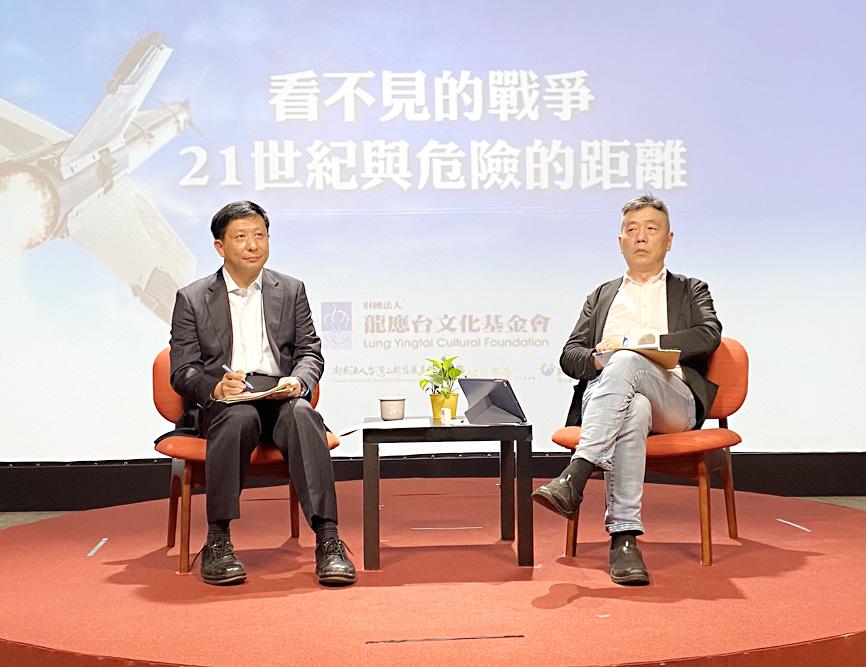Taiwan should continue to procure equipment and services from the US to maintain its Patriot missile defense system, as it is the nation’s first line of defense against a Chinese missile attack should a cross-strait war break out, defense experts said yesterday.
The comments came after Washington on Tuesday announced that it has approved the sale of US$95 million of training and equipment to maintain Taiwan’s Patriot missile defense system.
Three defense experts told the Central News Agency that the deal involving logistical support, maintenance and spare parts is crucial for Taiwan’s operation of the defense system.

Photo: CNA
Su Tzu-yun (蘇紫雲), an analyst at the government-funded Institute for National Defense and Security Research, said Russia’s invasion of Ukraine has exposed the latter’s lack of a medium to long-range missile defense system, which makes it vulnerable to Russian missile attacks.
Compared with Ukraine, Taiwan’s Patriot missile system allows the nation to intercept incoming missiles, although there is some disagreement as to its efficacy, Su said.
In addition to the US system, Taiwan’s military is also equipped with locally developed Tien Kong (Sky Bow) surface-to-air missiles.
These complement the Patriot missile system to establish more comprehensive air defenses against China, Su said.
Chieh Chung (揭仲), an associate research fellow at the National Policy Foundation in Taipei, said that Patriot Advanced Capability-3 (PAC-3) missiles are smaller, more agile and more accurate, and can be deployed in large numbers, which makes them highly effective against ballistic missiles.
He added that the Sky Bow system can intercept incoming enemy aircraft in addition to ballistic missiles.
Chou Yu-ping (周宇平), a retired air force colonel from the Air Missile Defense Command, said Taiwan uses the PAC-3 and upgraded PAC-2 systems.
He said that PAC-2 and PAC-3 have both proven capable of intercepting missiles in combat.
The military last month confirmed that it has reached a deal with the US to buy an upgraded version of PAC-3, namely PAC-3 Missile Segment Enhancement, with delivery to start in 2025 and deployment the following year.
The latest arms deal announced on Tuesday could also mean the US will send personnel to Taiwan to prepare for the PAC-3 upgrades, Chieh said.
It was the third arms sale approved since US President Joe Biden took office in January last year.
The first, approved in August last year, is for the acquisition of 40 Paladin M109A6 self-propelled howitzers at a cost of US$750 million.
The second, approved in February, is worth US$100 million, and includes equipment and services to support participation in the Patriot International Engineering Services Program and Field Surveillance Program for five years.

Costa Rica sent a group of intelligence officials to Taiwan for a short-term training program, the first time the Central American country has done so since the countries ended official diplomatic relations in 2007, a Costa Rican media outlet reported last week. Five officials from the Costa Rican Directorate of Intelligence and Security last month spent 23 days in Taipei undergoing a series of training sessions focused on national security, La Nacion reported on Friday, quoting unnamed sources. The Costa Rican government has not confirmed the report. The Chinese embassy in Costa Rica protested the news, saying in a statement issued the same

Taiwan is to extend its visa-waiver program for Philippine passport holders for another year, starting on Aug. 1, Minister of Foreign Affairs Lin Chia-lung (林佳龍) said on Friday. Lin made the announcement during a reception in Taipei marking the 127th anniversary of Philippine independence and the 50th anniversary of the establishment of the Manila Economic and Cultural Office (MECO) in Taiwan, the Ministry of Foreign Affairs said. The decision reflected Taiwan’s commitment to deepening exchanges with the Philippines, the statement cited Lin as saying, adding that it was a key partner under the New Southbound Policy launched in 2016. Lin also expressed hope

Temperatures in New Taipei City’s Sindian District (新店) climbed past 37°C yesterday, as the Central Weather Administration (CWA) issued heat alerts for 16 municipalities, warning the public of intense heat expected across Taiwan. The hottest location in Taiwan was in Sindian, where the mercury reached 37.5°C at about 2pm, according to CWA data. Taipei’s Shilin District (士林) recorded a temperature of 37.4°C at noon, Taitung County’s Jinfeng Township (金峰) at 12:50 pm logged a temperature of 37.4°C and Miaoli County’s Toufen Township (頭份) reached 36.7°C at 11:40am, the CWA said. The weather agency yesterday issued a yellow level information notice for Taipei, New

CASE: Prosecutors have requested heavy sentences, citing a lack of remorse and the defendants’ role in ‘undermining the country’s democratic foundations’ Five people affiliated with the Chinese Nationalist Party (KMT), including senior staff from the party’s Taipei branch, were indicted yesterday for allegedly forging thousands of signatures to recall two Democratic Progressive Party (DPP) lawmakers. Those indicted include KMT Taipei chapter director Huang Lu Chin-ru (黃呂錦茹), secretary-general Chu Wen-ching (初文卿) and secretary Yao Fu-wen (姚富文), the Taipei District Prosecutors’ Office said in a news release. Prosecutors said the three were responsible for fabricating 5,211 signature forms — 2,537 related to the recall of DPP Legislator Wu Pei-yi (吳沛憶) and 2,674 for DPP Legislator Rosalia Wu (吳思瑤) — with forged entries accounting for